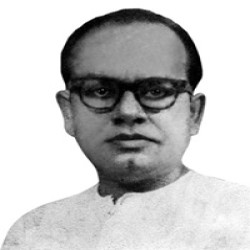
Jyotirmoy Guhathakurta
| Date of Birth | : | 10 July, 1920 |
| Date of Death | : | 30 March, 1971 (Aged 50) |
| Place of Birth | : | Mymensingh, Bangladesh |
| Profession | : | Liberation War |
| Nationality | : | Bangladeshi |
Jyotirmoy Guhathakurta (জ্যোতির্ময় গুহঠাকুরতা) was a educator and humanist of the former now He was one of the Bengali intellectuals killed by the during the on the night of 25 March 1971.
Background and education
Guhathakurta was born to Sri. Kumud Chandra Guhathakurta and Smt. Sumati on 10 July 1920 in town. Both of his parents were school teachers. They were originally from After matriculating in 1936 from he joined in to study Intermediate Science. But he could not attend his final exams there because o . He came back to Mymensingh and took admission in from where he passed Intermediate Arts in 1939. Guhathakurta then got himself admitted in the Department of English of Dhaka University and graduated with honors in 1942, and was first in the class. His excellent academic results earned him the Pope Memorial Gold Medal in Literature. He completed his masters the following year in the same institute
Career
Guhathakurta taught in a number of colleges from 1944 to 1949, such as AM College in Mymensingh, in Dhaka. In 1949 he joined the University of Dhaka as a lecturer in English. In 1963, he went to King's College, London University, on a British Council scholarship to do doctoral work on "Classical Myths in the Plays of Swinburne, Bridges, Sturges, Moore, and Eliot". In 1967, Guhathakurta returned to Dhaka University and was promoted to a position he held until his death.
Assassination
After midnight 25 March 1971, Professor Jotirmoy Guhathakurta was shot in the dark by the Pakistani Army just outside the University building where he lived while at the same time another professor A.N.M. Maniruzzaman and three members of Maniruzzaman's family was shot in the landing of the stairwell of the same building. On the 27th of March, he was taken to the hospital which was almost deserted except for the wounded, with a handful of doctors to attend. After two days with hardly a regular medical attendant, he died due to severe loss of blood.